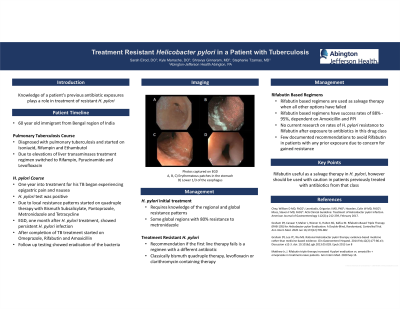Monday Poster Session
Category: Stomach
P2791 - Treatment Resistant Helicobacter pylori in a Patient with Tuberculosis
Monday, October 23, 2023
10:30 AM - 4:15 PM PT
Location: Exhibit Hall

Has Audio

Sarah Elrod, DO
Jefferson Abington Hospital
Abington, PA
Presenting Author(s)
Sarah Elrod, DO1, Kyle Marrache, DO1, Shravya Ginnaram, MD1, Stephanie Tzarnas, MD2
1Jefferson Abington Hospital, Abington, PA; 2Einstein Medical Center, Philadelphia, PA
Introduction: Treatment resistant Helicobacter pylori infections require special considerations when choosing a treatment regimen. This case examines a patient with previous exposure to rifampin from tuberculosis treatment is started on a rifabutin based salvage therapy for his H pylori.
Case Description/Methods: At the age of 60 years old our patient, an immigrant from the Bengal region of India, was diagnosed with pulmonary tuberculosis. He started isoniazid, rifampin and ethambutol, but later switched to rifampin, pyrazinamide and levaquin due to elevations in his liver transaminases. A year into treatment he started having epigastric pain and nausea and tested positive for H pylori. Due to documented local resistance to triple therapy, he started quadruple therapy with bismuth subsalicylate, pantoprazole, metronidazole and tetracycline. An EGD one month after completing quadruple therapy showed persistent H pylori infection. Following completion of his tuberculosis treatment he started on omeprazole, rifabutin and amoxicillin for H pylori salvage therapy. Follow up H pylori testing showed eradication of the bacteria.
Discussion: H pylori resistant to antibiotics is a well-documented concern when picking a treatment. Knowledge of the regional resistance pattern is crucial when choosing between a metronidazole or clarithromycin-based regiment, as some areas have metronidazole resistance as high as 80%. One of the main deciding factors in resistance is prior exposure to antibiotics.
If the first regimen fails, the second line is using an antibiotic not used in the initial treatment such as, a bismuth quadruple therapy, levofloxacin or clarithromycin containing therapy. Rifabutin based regimens are typically used as salvage therapy when there are few other options remaining. In studies looking at rifabutin based regimens success rates range from 88% to 95%, depending on length of therapy and dosage of the amoxicillin and PPI.
In trials looking at use of rifabutin, most have not found H pylori resistance to rifabutin prior to starting the treatment regimen. There is no documentation of rates of prior exposure to rifabutin or other antibiotics in this drug class. Some recommendations council avoiding use of rifabutin if the patient had any prior exposure due to a theoretical risk of gained resistance. There are currently no studies proving an acquired resistance to rifabutin with prior exposure. In this patient despite prior exposure to rifampin, he was successfully treated with a rifabutin based therapy.
Disclosures:
Sarah Elrod, DO1, Kyle Marrache, DO1, Shravya Ginnaram, MD1, Stephanie Tzarnas, MD2. P2791 - Treatment Resistant Helicobacter pylori in a Patient with Tuberculosis, ACG 2023 Annual Scientific Meeting Abstracts. Vancouver, BC, Canada: American College of Gastroenterology.
1Jefferson Abington Hospital, Abington, PA; 2Einstein Medical Center, Philadelphia, PA
Introduction: Treatment resistant Helicobacter pylori infections require special considerations when choosing a treatment regimen. This case examines a patient with previous exposure to rifampin from tuberculosis treatment is started on a rifabutin based salvage therapy for his H pylori.
Case Description/Methods: At the age of 60 years old our patient, an immigrant from the Bengal region of India, was diagnosed with pulmonary tuberculosis. He started isoniazid, rifampin and ethambutol, but later switched to rifampin, pyrazinamide and levaquin due to elevations in his liver transaminases. A year into treatment he started having epigastric pain and nausea and tested positive for H pylori. Due to documented local resistance to triple therapy, he started quadruple therapy with bismuth subsalicylate, pantoprazole, metronidazole and tetracycline. An EGD one month after completing quadruple therapy showed persistent H pylori infection. Following completion of his tuberculosis treatment he started on omeprazole, rifabutin and amoxicillin for H pylori salvage therapy. Follow up H pylori testing showed eradication of the bacteria.
Discussion: H pylori resistant to antibiotics is a well-documented concern when picking a treatment. Knowledge of the regional resistance pattern is crucial when choosing between a metronidazole or clarithromycin-based regiment, as some areas have metronidazole resistance as high as 80%. One of the main deciding factors in resistance is prior exposure to antibiotics.
If the first regimen fails, the second line is using an antibiotic not used in the initial treatment such as, a bismuth quadruple therapy, levofloxacin or clarithromycin containing therapy. Rifabutin based regimens are typically used as salvage therapy when there are few other options remaining. In studies looking at rifabutin based regimens success rates range from 88% to 95%, depending on length of therapy and dosage of the amoxicillin and PPI.
In trials looking at use of rifabutin, most have not found H pylori resistance to rifabutin prior to starting the treatment regimen. There is no documentation of rates of prior exposure to rifabutin or other antibiotics in this drug class. Some recommendations council avoiding use of rifabutin if the patient had any prior exposure due to a theoretical risk of gained resistance. There are currently no studies proving an acquired resistance to rifabutin with prior exposure. In this patient despite prior exposure to rifampin, he was successfully treated with a rifabutin based therapy.
Disclosures:
Sarah Elrod indicated no relevant financial relationships.
Kyle Marrache indicated no relevant financial relationships.
Shravya Ginnaram indicated no relevant financial relationships.
Stephanie Tzarnas indicated no relevant financial relationships.
Sarah Elrod, DO1, Kyle Marrache, DO1, Shravya Ginnaram, MD1, Stephanie Tzarnas, MD2. P2791 - Treatment Resistant Helicobacter pylori in a Patient with Tuberculosis, ACG 2023 Annual Scientific Meeting Abstracts. Vancouver, BC, Canada: American College of Gastroenterology.
